Fleurs du Mal Magazine


Or see the index

It is the hour
It is the hour when from the boughs
The nightingale’s high note is heard;
It is the hour — when lover’s vows
Seem sweet in every whisper’d word;
And gentle winds and waters near,
Make music to the lonely ear.
Each flower the dews have lightly wet,
And in the sky the stars are met,
And on the wave is deeper blue,
And on the leaf a browner hue,
And in the Heaven that clear obscure
So softly dark, and darkly pure,
That follows the decline of day
As twilight melts beneath the moon away.
George Gordon Byron
(1788 – 1824)
It is the hour
(Poem)
• fleursdumal.nl magazine
More in: Archive A-B, Archive A-B, Byron, Lord
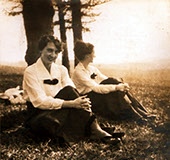
The Gates of Utterance
There is a throng within the gates,
A pressing, diverse throng;
Without, a peaceful throng awaits,
To which I would belong.
Within the gates the varied folk
Advise discordantly;
Without, the poet-crowds convoke
To council harmony.
Within the gates are all the heights
And depths of serried powers;
But when a lyric theme invites,
I reach out-lying bowers
Where dwell the bards of quiet years ;
I join my song to theirs;
My glad, unfettered spirit hears
The melody it shares.
Gladys Cromwell
(1885-1919)
The Gates of Utterance
From: Songs of the Dust, 1915
• fleursdumal.nl magazine
More in: Archive C-D, Archive C-D, Cromwell, Gladys, Gladys Cromwell
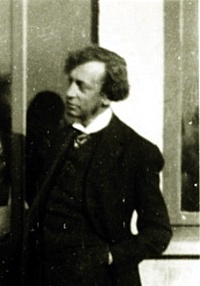
Gelijk een arme, blinde hond
Geljk een arme, blinde hond
van alle troost verstoken,
dwaal ‘k door de zoele avond rond
en ruik de lente-roken.
Er waart – lijk om een vrouwe-kleed
waar oude driften in hangen –
er waart een geur van schamper leed
en van huilend-moe verlangen.
En ‘k dwaal, een blinde hond gelijk,
door dralige lente-roken,
mijn hart van alle liefden rijk,
mijn hart van liefde verstoken.
Karel van de Woestijne
(1878 – 1929)
Gelijk een arme, blinde hond
• fleursdumal.nl magazine
More in: Archive W-X, Archive W-X, Woestijne, Karel van de
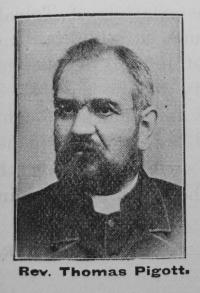
The Lion
(Being an essay written by a pupil
in Dame Europa’s School)
The Lion is a kind of Ass,
His silliness is simply crass ;
He’s such a tame, long-suffering beast
You cannot rile him in the least,
For, though he’s very, very strong,
He never will resent a wrong ;
So, though he’s very, very big.
The other beasts don’t care a fig,
But pinch his tail and tweak his ear.
For he won’t mind — He’s such a dear !
They give him most tremendous snubs.
And kill whole litters of his cubs ;
He’ll sometimes give one little roar,
Montague Horatio Mostyn Turtle Pigott
(1865–1927)
The Lion (Poem)
• fleursdumal.nl magazine
More in: Archive O-P, Mostyn Turtle Pigott, Natural history
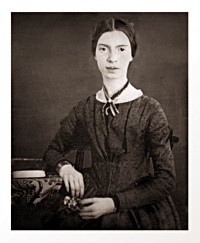
I measure every Grief I meet
I measure every Grief I meet
With narrow, probing, eyes –
I wonder if It weighs like Mine –
Or has an Easier size.
I wonder if They bore it long –
Or did it just begin –
I could not tell the Date of Mine –
It feels so old a pain –
I wonder if it hurts to live –
And if They have to try –
And whether – could They choose between –
It would not be – to die –
I note that Some – gone patient long –
At length, renew their smile –
An imitation of a Light
That has so little Oil –
I wonder if when Years have piled –
Some Thousands – on the Harm –
That hurt them early – such a lapse
Could give them any Balm –
Or would they go on aching still
Through Centuries of Nerve –
Enlightened to a larger Pain –
In Contrast with the Love –
The Grieved – are many – I am told –
There is the various Cause –
Death – is but one – and comes but once –
And only nails the eyes –
There’s Grief of Want – and grief of Cold –
A sort they call “Despair” –
There’s Banishment from native Eyes –
In sight of Native Air –
And though I may not guess the kind –
Correctly – yet to me
A piercing Comfort it affords
In passing Calvary –
To note the fashions – of the Cross –
And how they’re mostly worn –
Still fascinated to presume
That Some – are like my own –
Emily Dickinson
(1830-1886)
I measure every Grief I meet
• fleursdumal.nl magazine
More in: Archive C-D, Dickinson, Emily
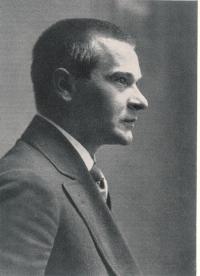
Die junge Magd
1
Oft am Brunnen, wenn es dämmert,
Sieht man sie verzaubert stehen
Wasser schöpfen, wenn es dämmert.
Eimer auf und niedergehen.
In den Buchen Dohlen flattern
Und sie gleichet einem Schatten.
Ihre gelben Haare flattern
Und im Hofe schrein die Ratten.
Und umschmeichelt von Verfalle
Senkt sie die entzundenen Lider.
Dürres Gras neigt im Verfalle
Sich zu ihren Füßen nieder.
2
Stille schafft sie in der Kammer
Und der Hof liegt längst verödet.
Im Hollunder vor der Kammer
Kläglich eine Amsel flötet.
Silbern schaut ihr Bild im Spiegel
Fremd sie an im Zwielichtscheine
Und verdämmert fahl im Spiegel
Und ihr graut vor seiner Reine.
Traumhaft singt ein Knecht im Dunkel
Und sie starrt von Schmerz geschüttelt.
Röte träufelt durch das Dunkel.
Jäh am Tor der Südwind rüttelt.
3
Nächtens übern kahlen Anger
Gaukelt sie in Fieberträumen.
Mürrisch greint der Wind im Anger
Und der Mond lauscht aus den Bäumen.
Balde rings die Sterne bleichen
Und ermattet von Beschwerde
Wächsern ihre Wangen bleichen.
Fäulnis wittert aus der Erde.
Traurig rauscht das Rohr im Tümpel
Und sie friert in sich gekauert.
Fern ein Hahn kräht. Übern Tümpel
Hart und grau der Morgen schauert.
4
In der Schmiede dröhnt der Hammer
Und sie huscht am Tor vorüber.
Glührot schwingt der Knecht den Hammer
Und sie schaut wie tot hinüber.
Wie im Traum trifft sie ein Lachen;
Und sie taumelt in die Schmiede,
Scheu geduckt vor seinem Lachen,
Wie der Hammer hart und rüde.
Hell versprühn im Raum die Funken
Und mit hilfloser Geberde
Hascht sie nach den wilden Funken
Und sie stürzt betäubt zur Erde.
5
Schmächtig hingestreckt im Bette
Wacht sie auf voll süßem Bangen
Und sie sieht ihr schmutzig Bette
Ganz von goldnem Licht verhangen.
Die Reseden dort am Fenster
Und den bläulich hellen Himmel.
Manchmal trägt der Wind ans Fenster
Einer Glocke zag Gebimmel.
Schatten gleiten übers Kissen,
Langsam schlägt die Mittagsstunde
Und sie atmet schwer im Kissen
Und ihr Mund gleicht einer Wunde.
6
Abends schweben blutige Linnen,
Wolken über stummen Wäldern,
Die gehüllt in schwarze Linnen,
Spatzen lärmen auf den Feldern.
Und sie liegt ganz weiß im Dunkel.
Unterm Dach verhaucht ein Girren.
Wie ein Aas in Busch und Dunkel
Fliegen ihren Mund umschwirren.
Traumhaft klingt im braunen Weiler
Nach ein Klang von Tanz und Geigen,
Schwebt ihr Antlitz durch den Weiler,
Weht ihr Haar in kahlen Zweigen.
Georg Trakl
(1887 – 1914)
Die junge Magd, 1913
•fleursdumal.nl magazine
More in: Archive S-T, Trakl, Georg, Trakl, Georg
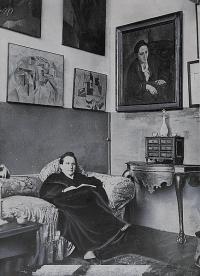 Johnny Grey
Johnny Grey
What did he say. I was disagreeing with him. He said he didn’t have it by his side. He said. Hurry.
Eat it.
I am not going to talk about it. I am not going to talk about it.
Another thing.
This is mentioned. He was silly. He said there would have been many more elevators if it hadn’t been for this war.
He was so thirsty.
They asked him.
Please.
If it weren’t for them there would be wind.
I said there wasn’t.
I said it was balmy.
I said that when I was little I asked for a closet.
This was the way it was written.
I was awed.
It is so injudicious to make plans.
We will not decide about three.
Three is the best way to add.
The bank opens tomorrow.
I was mistaken.
I hope I can continue.
To be a tailor.
The other said nothing.
The other one said he was hindering him and he made that mistake and he would not prepare further.
It is not deceiving.
I can say so gladly.
It’s always better.
It’s wonderful how it always comes out.
Conversational.
Plants were said to bring lining together. This is not deceived. This is not deceived. Plants.
Plants were said to bring meadows springing. Shattering stubbornly in their teeth.
Plants aid sad and not furniture.
This is it.
Plants are riotous.
Not even.
If you give money.
Plants are said to be left out if you give money.
Join or gray.
Points are spoken. This in one. Picturesque. It is just the same.
I cannot freeze.
I understand a picture. It is to have stop it who does. It is to have asked about it the sneezing bell. Bell or better.
A simple extenuation.
I mean to be fine with it.
A picture with all of it bitten by that supper. Call it. I shall please. Nowadays.
I find this a very pleasant pencil. Do I. I find this a very pleasant pencil. Do I find this a pleasant pencil.
How to give soldiers fresh water.
How do you.
You use the echoes.
Dear Jenny.
I am your brother. Nestling.
Nestling noses.
My gay.
Baby.
Little.
Lobster.
Chatter.
Sweet.
Joy.
My.
Baby.
Example.
Be good.
Always.
Six.
Seven.
Eight.
Nine.
All.
The.
Time.
Me.
Extra.
My.
Baby.
Scenes where there is no piece of a let it go.
No I am not pleased with their descriptions.
This is not their year.
Two of them.
Johnny Grey and Eddy.
Why not however.
It was not polite.
A long way.
I understand and I say, I understand him to say that, I see him I say I see him or I say, I say that I understand. What is it. He doesn’t realise. I don’t say that he isn’t there I don’t solidly favor him. I said I was prepared. I was prepared to relieve him. I was prepared to relieve him then or then and I was holding, I was holding anything. I am often for them. They gave it. They were pleased. So pleased and side with it. So pleased and have it. So have it and say it. Say it then. If he was promised, it, he had been left by the belief. He had the action. All old. In it. He was wretched. I do not believe or for it. I do not arouse rubbers. When we went away were we then told to be left with them. Do they or do they do it. Do they believe the truth.
I am beginning. Go on Saturday. I believe for Sunday. We deceived everbody.
I forgot to drink water.
No I haven’t seen it.
He said it.
It’s wonderful.
Target.
They don’t believe it either.
Call it.
That.
Fat.
Cheeks.
By.
That.
Time.
Drenced.
By.
That.
Time.
Obligation.
To sign.
That
Today
When
By
That
Field.
He said he was a Spanish family.
It will make.
A
Terrible
Not terrible.
It will not make that one believe me it is not for my pleasure that I promise it.
No
Neither.
That
Or
Another
Neither
One
Lightly
Widened.
Widened by what.
Not this.
Not left.
Buy
Their
It’s not a country.
I told him so.
I wish to begin.
Lining.
Of that thing.
By that time.
It.
Or.
It.
Was.
How.
We don’t know whom to invite for lunch. You told me you’d tell me. I don’t know.
Either.
I do get wonderful action into them don’t I.
Blame.
Worthy.
Out.
Standing.
Eraser.
That was a seat.
Leave it out.
Seat.
Stretch.
Sober.
Left.
Over.
Curling.
Irresistible.
I come to it at last.
I know what I want.
Call.
Tried.
To be.
Just.
Seated.
Beside.
The.
Meaning.
Please come.
I met.
A steady house which was neither blocking nor behaving as if it would for the road.
He looks like it.
A ladder insults.
Me.
I do stem when in.
I don’t look at them any more.
Johnny Grey.
What did I say.
I said I would leave it.
He was so kind.
That was lasting.
I am so certain.
Please.
It’s remarkable that I can make good sentences.
It reminds me of a play that I remember which is better.
It is better.
Everything.
In.
I am coming.
To it.
I know it.
Please.
Pleased.
Pleased with me.
Pleased with me.
Canvas covers.
I wished to go away.
I asked for an astonishing green I asked for more Bertie.
I asked only once.
Pack it.
Package.
A little leaving.
We went to eat.
I have plenty of food.
Always.
Nearly.
Always.
Certainly.
By an example.
I was never afraid.
He doesn’t say anything.
In that way.
Not after.
He was.
Sure.
Of it.
Then.
By then.
We were.
In Munich.
And sat.
Today.
By way
Of
Staring.
And nearly all of it.
In.
That.
Shining.
Firm.
Spread.
Paul.
Slices.
If I copy nature.
If I copy nature.
If I copy nature.
If I copy nature.
For it.
Open.
Seen
Piling.
Left.
In.
Left in.
Not in.
Border
Sew.
Spaces.
I.
Mean.
To.
Laugh.
Do be.
Do be all.
Do be all out.
If you can.
Come.
To stay.
And.
After.
All.
Have.
A.
Night.
Which.
Means.
That.
There
Is.
Not
This
Essential.
By that way.
It was all out in it.
By this time.
Which was reasonable and an explanation.
We never expected he would tell a lie.
Not this.
For.
More.
To be.
Indians are disappointing.
Not to me.
I was never disappointed in an Indian.
I was never disappointed in an Indian in any way.
How old are you.
Careless.
Heavy all the time.
I know she is.
I am.
Politely.
Finished.
Gertrude Stein
(1874-1946)
Johnny Grey
• fleursdumal.nl magazine
More in: Archive S-T, Archive S-T, Gertrude Stein, Stein, Gertrude
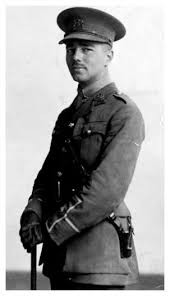
Strange Meeting
It seemed that out of battle I escaped
Down some profound dull tunnel, long since scooped
Through granites which titanic wars had groined.
Yet also there encumbered sleepers groaned,
Too fast in thought or death to be bestirred.
Then, as I probed them, one sprang up, and stared
With piteous recognition in fixed eyes,
Lifting distressful hands, as if to bless.
And by his smile, I knew that sullen hall,—
By his dead smile I knew we stood in Hell.
With a thousand fears that vision’s face was grained;
Yet no blood reached there from the upper ground,
And no guns thumped, or down the flues made moan.
“Strange friend,” I said, “here is no cause to mourn.”
“None,” said that other, “save the undone years,
The hopelessness. Whatever hope is yours,
Was my life also; I went hunting wild
After the wildest beauty in the world,
Which lies not calm in eyes, or braided hair,
But mocks the steady running of the hour,
And if it grieves, grieves richlier than here.
For by my glee might many men have laughed,
And of my weeping something had been left,
Which must die now. I mean the truth untold,
The pity of war, the pity war distilled.
Now men will go content with what we spoiled.
Or, discontent, boil bloody, and be spilled.
They will be swift with swiftness of the tigress.
None will break ranks, though nations trek from progress.
Courage was mine, and I had mystery;
Wisdom was mine, and I had mastery:
To miss the march of this retreating world
Into vain citadels that are not walled.
Then, when much blood had clogged their chariot-wheels,
I would go up and wash them from sweet wells,
Even with truths that lie too deep for taint.
I would have poured my spirit without stint
But not through wounds; not on the cess of war.
Foreheads of men have bled where no wounds were.
“I am the enemy you killed, my friend.
I knew you in this dark: for so you frowned
Yesterday through me as you jabbed and killed.
I parried; but my hands were loath and cold.
Let us sleep now. . . .”
Wilfred Owen
(1893 – 1918)
Strange Meeting (Poem)
• fleursdumal.nl magazine
More in: Archive O-P, Archive O-P, Galerie des Morts, Owen, Wilfred, WAR & PEACE
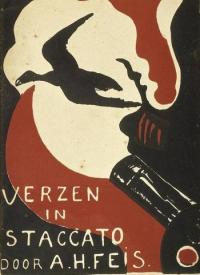
De slag.
De zon.
Een woud.
Een veld.
Een vliet:
‘t Is geel,
groen, blauw,
maar rood
is ‘t niet.
Gerij.
Gedraaf.
Geschut.
Gedreun:
Gegil!
Gekerm!
Gezucht!
Gekreun!
Geen zon.
Geen woud.
Geen mensch!
Geen hart!
‘t Is bloed!
‘t Is rood!
‘t Is grijs!
‘t Is zwart!
Agnita Feis
(1881 – 1944)
Uit: Oorlog. Verzen in Staccato (1916).
De Slag
• fleursdumal.nl magazine
More in: - Book Stories, Agnita Feis, Archive E-F, Archive E-F, De Stijl, Feis, Agnita, Theo van Doesburg

Euthanasia
When Time, or soon or late, shall bring
The dreamless sleep that lulls the dead,
Oblivion! may thy languid wing
Wave gently o’er my dying bed!
No band of friends or heirs be there,
To weep, or wish, the coming blow:
No maiden, with dishevelled hair,
To feel, or feign, decorous woe.
But silent let me sink to earth,
With no officious mourners near:
I would not mar one hour of mirth,
Nor startle friendship with a tear.
Yet Love, if Love in such an hour
Could nobly check its useless sighs,
Might then exert its latest power
In her who lives, and him who dies.
‘Twere sweet, my Psyche! to the last
Thy features still serene to see:
Forgetful of its struggles past,
E’en Pain itself should smile on thee.
But vain the wish?for Beauty still
Will shrink, as shrinks the ebbing breath;
And women’s tears, produced at will,
Deceive in life, unman in death.
Then lonely be my latest hour,
Without regret, without a groan;
For thousands Death hath ceas’d to lower,
And pain been transient or unknown.
`Ay, but to die, and go,’ alas!
Where all have gone, and all must go!
To be the nothing that I was
Ere born to life and living woe!
Count o’er the joys thine hours have seen,
Count o’er thy days from anguish free,
And know, whatever thou hast been,
‘Tis something better not to be.
George Gordon Byron
(1788 – 1824)
Euthanasia
(Poem)
• fleursdumal.nl magazine
More in: Archive A-B, Archive A-B, Byron, Lord
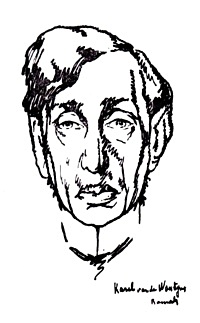
Kind met het bleek gelaat
Kind met het bleek gelaat, dat van uw wijde blikken
geen liefde in mat gebaar noch in lede ogen ziet,
maar in uw zedig kleed uw knieën weet te schikken
zó, dat me te elken male een laaie drift doorschiet:
gij zult het nimmer aan mijn vrome woorden weten
hoe mijn begeren om uw kleren dolen dorst;
maar ìk draag in me-zelf de wonde, zelf gereten,
waarvan de koortse rilt en davert door mijn borst.
Want ‘k heb de straffe zélf in ‘t lillend vlees geslagen;
ik heb een spijt’ge spot gehamerd in mijn brein…
– Gij echter, ga voorbij, arm kind, en zónder vragen:
ik haat u om dees geert’, die ‘k minne om deze pijn…
Karel van de Woestijne
(1878 – 1929)
Kind met het bleek gelaat
Portret: Karel van de Woestijne, Ramah – Journal Het Roode Zeil, 15 April 1920
• fleursdumal.nl magazine
More in: Archive W-X, Archive W-X, Woestijne, Karel van de
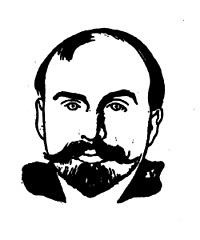
Triolet En Scie Majeure
Ce jeune lapin gras et digne
A pour petit nom Daniel.
Il est rouge comme une guigne,
Ce jeune lapin gras et digne.
Vous n’avez qu’à lui faire signe:
Il file doux comme du miel.
Ce jeune lapin gras et digne
A pour petit nom Daniel.
Ce jeune lapin gras et digne
A pour petit nom Daniel.
Si vous avez une consigne,
Ce jeune lapin gras et digne
De sa main blanche comme un cygne
Vous fera monter jusqu’au ciel.
Ce jeune lapin gras et digne
A pour petit nom Daniel.
Ce jeune lapin gras et digne
A pour petit nom Daniel.
Le teint fleuri comme la vigne,
Ce jeune lapin gras et digne,
Avec une oeillade maligne,
Flûte en parlant, comme Ariel.
Ce jeune lapin gras et digne
A pour petit nom Daniel.
Ce jeune lapin gras et digne
A pour petit nom Daniel.
Depuis huit jours il a la guigne,
Ce jeune lapin gras et digne:
Je ne puis écrire une ligne
Sans qu’il y soit trempé de fiel.
Ce jeune lapin gras et digne
A pour petit nom Daniel.
Marcel Schwob
(1867-1905)
Triolet En Scie Majeure
Juin 1888
Portrait: Félix Vallotton
• fleursdumal.nl magazine
More in: Archive S-T, Archive S-T, Félix Vallotton, Marcel Schwob
Thank you for reading Fleurs du Mal - magazine for art & literature